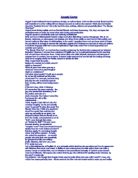Whilst the subversion of this trope could exhibit the breakthrough of feminism, for example the British Women’s Liberation Movement which occurred in 1970-1978, Carter reminds the reader of the authority men have over women, and how the government (predominantly male at the time) can control the extent to which women reach equality. She does this through the symbol of the father’s gun. The narrator’s mother uses her father’s gun to kill the Marquis, exemplifying the lingering sense of a patriarchal system, suggesting that the mother could not have saved her daughter, had she not used the father’s gun. This also demonstrates the reliance of women on men and their authoritative stance in society, again highlighting how women are deadened by habit, by ultimately succumbing to the social construct that women are less than men, both physically and mentally.
Despite being financially stable, the narrator recounts her journey “into marriage” as a journey “into exile”. Here, Carter stresses the concept of marriage leading her towards entrapment, as she feels as though she will be cut off from her previous life in succumbing to her fate as a woman in society; “I had […] ceased to be her child in becoming his wife”. Carter again emphasises the innocence and purity in women by presenting her as a child. Similarly, in ‘Wolf Alice’, Alice “like the beasts, lives without a future.” This highlights how women lack control over their own lives, and cannot speak on matters that are personal such as marriage, and must accept their fate. This is further implicated when Carter demonstrates how women are always treated as other in their society; “she would have called herself a wolf, but she cannot speak.” The use of the present tense exemplifies the idea that this is a current issue, and although women have come a long way, the “intense polarity of the sexes” -Gordon (2004) means that there is still a substantial distance to go, which also presents the impotence of women in heterosexual relationships due to a power struggle. There is a further criticism of a patriarchal system in ‘The Snow Child’, where the Count gets whatever he asks for when he desires it, but he also dictates what the Countess and Snow Child can and cannot have. The Countess must watch her husband rape the dead girl’s body as she “reined in her stamping mare.” Here, Carter emphasises the importance of the male gaze and the broad acceptance of male sexuality and male sexual desire, and how female sexual desire seems illicit; “in herself a concrete denial of the idea of sexual pleasure since her sexuality has been placed at the service of reproductive function alone.” (Carter 1978). This is implicated in the ‘The Bloody Chamber’ where the Marquis’ description of the narrator becomes somewhat paedophilic in that he has a fondness for her childlike credulity and chastity; “my little love, my child”
Carter not only criticises society in order to empathise with the female audience, but also empowers them to grasp the fact that women are more deserving of rights, and therefore should not have to stand behind a man. Although in ‘The Snow Child’ the Countess is reliant on her husband, she does not obey him, and is adamant on getting her way. Her desires become commands; “Dive in and fetch it for me” // “Pick me one.” She tests the waters to see how far she’ll get with an authoritative tone, just as her husband is expected to have. Carter communicates to the reader that the ‘lamb-like nature’ of women is the root of their lack of authority. In order for action to be taken, women must divulge in their desires and requirements.
Similarly, in ‘The Bloody Chamber’, Carter suggests that men are keen on dominating women, not only due to an egotistical nature stemmed from societal constructs, but also because they understand the capacity that women have to overthrow the system. Essentially, female empowerment is threatening to them. This could be demonstrated when the narrator comes into contact with a young boy, and he emphasises that he could “be of come comfort” but “not much use”. This implicit suggestion that women’s interest in men is due to sexual desire highlights how men believe that if they are physically and sexually dominant, they can overthrow women. Whilst Margaret Atwood suggests women need protection, it is clear that men’s treatment of women is out of insecurity, fear and ignorance rather than concern and care.
Additionally the Marquis attacks the narrator’s sexual stance and loss of innocence in an attempt to belittle her; “Give it back, whore.” By criticising her against the way society has depicted the ideal woman, he becomes the embodiment of a patriarchal system, and an emotionally and mentally flawed and powerless male.
Overall, Carter’s criticism of the patriarchal system becomes a reciprocal for female empowerment, just as women become objects for men’s sexual desire. She suggests that if women are aware of their societal stance, they can overcome the tribulations of being a woman in a male dominated society, purely by understanding men’s intentions, and the root of their thirst for power.
i can't speak with anyone else.
and you know damn well,
for you I would ruin myself…
…a million little times.









